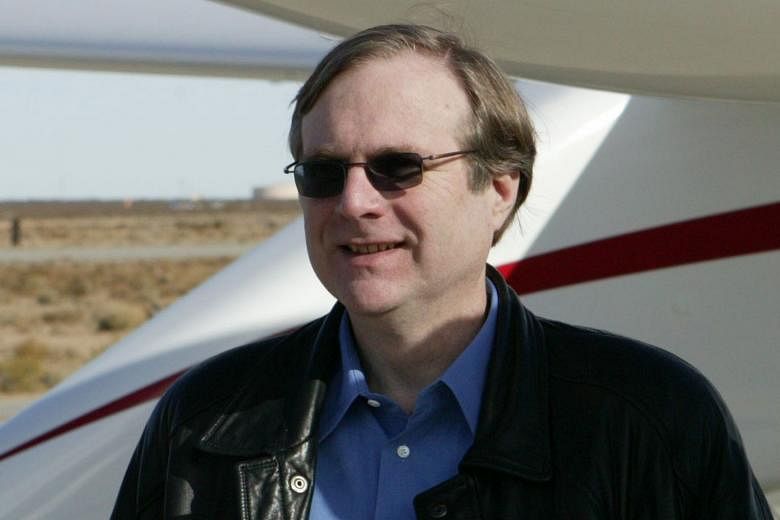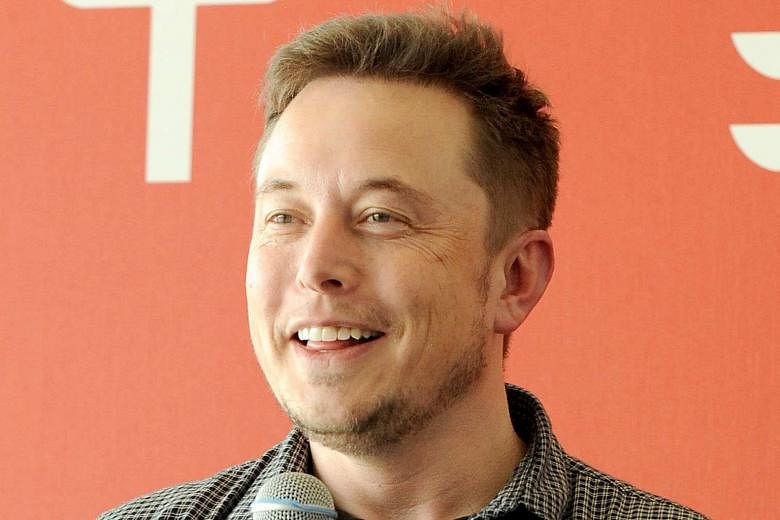PAUL ALLEN
As a child, 63-year-old Paul Allen, the co-founder of Microsoft, knew the names of the Mercury 7 astronauts as if they were the star players of his favourite baseball team.
"Like countless other boys, I planned to become an astronaut when I grew up," he wrote in his memoir. "For sheer adventure, you couldn't beat outer space."
In 2004, Mr Allen teamed up with legendary aerospace engineer Burt Rutan to develop SpaceShipOne, which won the Ansari X Prize, a US$10 million contest, and became the first commercial vehicle to reach space. Mr Allen licensed the rights to the technology behind the spacecraft to Mr Richard Branson and concentrated on other interests. But now he's back.
He's building Stratolaunch, which will be the world's largest plane with a wingspan wider than a football field. It is designed to carry a rocket tethered to its belly to an altitude of about 35,000 feet. The rocket would drop away from the plane, fire its engines and "air-launch" into orbit.
JEFF BEZOS
Launched by Amazon.com founder Jeff Bezos, Blue Origin envisions a time when millions of people live off-earth, the company's president Rob Meyerson told Space.com recently.
"We think if you want to get there, you need to be pushing the barriers of how to conduct really useful science ... of trying things out in microgravity."
Blue Origin's reusable New Shepard rocket system has flown to suborbital space five times, with the first lift-off coming in April last year and the latest occurring in June this year. The rocket is topped by a crew capsule that slips into suborbital space before both craft return to Earth in separate landings. The New Shepard booster lands vertically, using the same BE-3 engine that launched it; the six-passenger capsule returns to Earth under parachutes.
Mr Bezos, 52, who was five years old during the Apollo 11 moon landing and remembers watching it on his living room television with his parents and grandparents, has said he believes Blue Origin could start taking tourists by 2018.
Mr Bezos has talked about building "the highway to lower orbit" so that the next generation "will be able to use that heavy infrastructure that I put in place so there can be a huge dynamic entrepreneurial explosion in space". His goal is eventually to establish such a transportation link that all heavy industry could be moved off Earth into space, where companies could mine asteroids for their precious metals. Earth, then, could be preserved as if it were exclusively zoned "residential and light industrial", he said.
Nearly five decades after the United States beat the Soviet Union to the moon, another space race is emerging, this time among a class of hugely wealthy entrepreneurs. Driven by ego, outsize ambition and opportunity, they are investing hundreds of millions of dollars of their own money in an attempt to open up space to the masses and push human space travel far past where governments have gone.
ELON MUSK
After Mr Elon Musk, 45, sold his first company, Zip2, to Compaq, for more than US$300 million, he started thinking more seriously about space exploration and wondered when Nasa was planning on getting to Mars. He searched the space agency's website for its Mars plan but could not find one.
"Because, of course, there had to be a schedule," he said in a 2012 speech. "And I couldn't find it. I thought the problem was me. Because, of course, it must be here somewhere on this website, but just well hidden. And it turned out it wasn't on the website at all. Which was shocking."
Mr Musk, who also runs Tesla Motors, plans to send an uncrewed spacecraft to Mars as soon as 2018, and hopes that people could arrive by 2025. While that seemingly impossible goal remains aspirational, his company, SpaceX, continues to build bigger and more powerful rockets, and has disrupted the existing commercial and military launch markets by offering affordable and transparent prices.
Last year, however, a unmanned Falcon 9 rocket carrying cargo to the International Space Station blew up, forcing the company to delay all launches for six months. But it now has a backlog of more than 70 missions representing more than US$10 billion (S$13 billion) in revenue.
Later this year, Musk is planning the blast-off of a new rocket, the Falcon Heavy, that would be twice as powerful as any other in use and one of the biggest since the Apollo era's mighty Saturn V.
RICHARD BRANSON
Mr Richard Branson's goal is to create the first commercial spaceline. The 66-year-old founder of the Virgin Group says he's proud that more than 700 people - more than the approximately 550 people who have actually been to space - have bought tickets to ride on his spacecraft, some paying as much as US$250,000.
"Perhaps it is in our culture, perhaps it is in our DNA, or perhaps it is a bit of each of those, but we humans seem hard-wired to explore," Branson's Virgin Galactic says on its website. "But because government space agencies are not asked to help ordinary citizens to become astronauts, most of our planet's seven billion people have had no opportunity to experience space and all of its possibilities for themselves."
Virgin Galactic had said its first flight would be as early as 2009, but that has been delayed again and again, most recently when an aircraft came apart during a test flight, killing the co-pilot. Since then, the company has rebounded, unveiling its new spacecraft earlier this year.
Mr Branson has said he thinks people would prefer the comforts of SpaceShipTwo, a space plane that will land on a runway, over a rocket launch that would propel a thimble-like capsule into space that would then land under parachutes.
Source: Washington Post, Science.com




